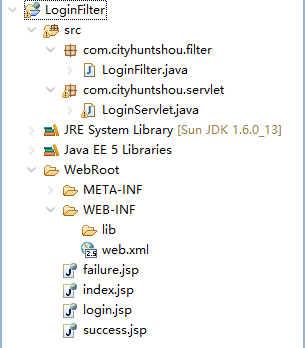Java Web过滤器详解
过滤器是什么玩意?
所谓过滤器,其实就是一个服务端组件,用来截取用户端的请求与响应信息。
过滤器的应用场景:
1.对用户请求进行统一认证,保证不会出现用户账户安全性问题
2.编码转换,可在服务端的过滤器中设置统一的编码格式,避免出现乱码
3.对用户发送的数据进行过滤替换
4.转换图像格式
5.对响应的内容进行压缩
其中,第1,2场景经常涉及。

login.jsp
<%@ page language="java" import="java.util.*" contentType="text/html; charset=utf-8"%> <% String path = request.getContextPath(); String basePath = request.getScheme()+"://"+request.getServerName()+":"+request.getServerPort()+path+"/"; %> <!DOCTYPE HTML PUBLIC "-//W3C//DTD HTML 4.01 Transitional//EN"> <html> <head> <base href="<%=basePath%>"> <title>My JSP 'login.jsp' starting page</title> <meta http-equiv="pragma" content="no-cache"> <meta http-equiv="cache-control" content="no-cache"> <meta http-equiv="expires" content="0"> <meta http-equiv="keywords" content="keyword1,keyword2,keyword3"> <meta http-equiv="description" content="This is my page"> <!-- <link rel="stylesheet" type="text/css" href="styles.css"> --> </head> <body> <form action="<%=path %>/servlet/LoginServlet" method="post" > 用户名:<input type="text" name="username" /> 密码:<input type="password" name="password" /> <input type="submit" value="登录" /> </form> </body> </html>
success.jsp
<%@ page language="java" import="java.util.*" pageEncoding="utf-8" contentType="text/html; charset=utf-8"%> <% String path = request.getContextPath(); String basePath = request.getScheme()+"://"+request.getServerName()+":"+request.getServerPort()+path+"/"; %> <!DOCTYPE HTML PUBLIC "-//W3C//DTD HTML 4.01 Transitional//EN"> <html> <head> <base href="<%=basePath%>"> <title>My JSP 'index.jsp' starting page</title> <meta http-equiv="pragma" content="no-cache"> <meta http-equiv="cache-control" content="no-cache"> <meta http-equiv="expires" content="0"> <meta http-equiv="keywords" content="keyword1,keyword2,keyword3"> <meta http-equiv="description" content="This is my page"> <!-- <link rel="stylesheet" type="text/css" href="styles.css"> --> </head> <body> </body> </html>
failure.jsp
<%@ page language="java" import="java.util.*" contentType="text/html; charset=utf-8"%> <% String path = request.getContextPath(); String basePath = request.getScheme()+"://"+request.getServerName()+":"+request.getServerPort()+path+"/"; %> <!DOCTYPE HTML PUBLIC "-//W3C//DTD HTML 4.01 Transitional//EN"> <html> <head> <base href="<%=basePath%>"> <title>My JSP 'login.jsp' starting page</title> <meta http-equiv="pragma" content="no-cache"> <meta http-equiv="cache-control" content="no-cache"> <meta http-equiv="expires" content="0"> <meta http-equiv="keywords" content="keyword1,keyword2,keyword3"> <meta http-equiv="description" content="This is my page"> <!-- <link rel="stylesheet" type="text/css" href="styles.css"> --> </head> <body> 登录失败,请检查用户名或密码! </body> </html>
LoginFilter.java
package com.cityhuntshou.filter;
import java.io.IOException;
import javax.servlet.Filter;
import javax.servlet.FilterChain;
import javax.servlet.FilterConfig;
import javax.servlet.ServletException;
import javax.servlet.ServletRequest;
import javax.servlet.ServletResponse;
import javax.servlet.http.HttpServletRequest;
import javax.servlet.http.HttpServletResponse;
import javax.servlet.http.HttpSession;
public class LoginFilter implements Filter {
private FilterConfig config;
public void destroy() {
}
public void doFilter(ServletRequest arg0, ServletResponse arg1,
FilterChain arg2) throws IOException, ServletException {
HttpServletRequest request = (HttpServletRequest) arg0;
HttpServletResponse response = (HttpServletResponse) arg1;
HttpSession session = request.getSession();
//过滤器实际应用场景之二-----编码转换
String charset = config.getInitParameter("charset");
if(charset == null)
{
charset = "UTF-8";
}
request.setCharacterEncoding(charset);
String noLoginPaths = config.getInitParameter("noLoginPaths");
if(noLoginPaths != null)
{
String[] strArray = noLoginPaths.split(";");
for(int i = 0; i < strArray.length; i++)
{
//空元素,放行
if(strArray[i] == null || "".equals(strArray[i]))
continue;
if(request.getRequestURI().indexOf(strArray[i]) != -1)
{
arg2.doFilter(arg0, arg1);
return;
}
}
}
if(request.getRequestURI().indexOf("login.jsp") != -1
|| request.getRequestURI().indexOf("LoginServlet") != -1)
{
arg2.doFilter(arg0, arg1);
return;
}
if(session.getAttribute("username") != null)
{
arg2.doFilter(arg0, arg1);
}
else
{
response.sendRedirect("login.jsp");
}
}
public void init(FilterConfig arg0) throws ServletException {
config = arg0;
}
}
LoginServlet.java
package com.cityhuntshou.servlet;
import java.io.IOException;
import java.io.PrintWriter;
import javax.servlet.ServletException;
import javax.servlet.http.HttpServlet;
import javax.servlet.http.HttpServletRequest;
import javax.servlet.http.HttpServletResponse;
import javax.servlet.http.HttpSession;
public class LoginServlet extends HttpServlet {
/**
* Constructor of the object.
*/
public LoginServlet() {
super();
}
/**
* Destruction of the servlet. <br>
*/
public void destroy() {
super.destroy(); // Just puts "destroy" string in log
// Put your code here
}
/**
* The doGet method of the servlet. <br>
*
* This method is called when a form has its tag value method equals to get.
*
* @param request the request send by the client to the server
* @param response the response send by the server to the client
* @throws ServletException if an error occurred
* @throws IOException if an error occurred
*/
public void doGet(HttpServletRequest request, HttpServletResponse response)
throws ServletException, IOException {
}
/**
* The doPost method of the servlet. <br>
*
* This method is called when a form has its tag value method equals to post.
*
* @param request the request send by the client to the server
* @param response the response send by the server to the client
* @throws ServletException if an error occurred
* @throws IOException if an error occurred
*/
public void doPost(HttpServletRequest request, HttpServletResponse response)
throws ServletException, IOException {
String username = request.getParameter("username");
String password = request.getParameter("password");
//new String(username.getBytes("ISO-8859-1"),"UTF-8")
System.out.println(username);
if("admin".equals(username) && "admin".equals(password))
{
//校验通过
HttpSession session = request.getSession();
session.setAttribute("username", username);
response.sendRedirect(request.getContextPath()+"/success.jsp");
}
else
{
//校验失败
response.sendRedirect(request.getContextPath()+"/failure.jsp");
}
}
/**
* Initialization of the servlet. <br>
*
* @throws ServletException if an error occurs
*/
public void init() throws ServletException {
// Put your code here
}
}
web.xml
<?xml version="1.0" encoding="UTF-8"?>
<web-app version="2.5"
xmlns="http://java.sun.com/xml/ns/javaee"
xmlns:xsi="http://www.w3.org/2001/XMLSchema-instance"
xsi:schemaLocation="http://java.sun.com/xml/ns/javaee
http://java.sun.com/xml/ns/javaee/web-app_2_5.xsd">
<display-name></display-name>
<servlet>
<description>This is the description of my J2EE component</description>
<display-name>This is the display name of my J2EE component</display-name>
<servlet-name>LoginServlet</servlet-name>
<servlet-class>com.cityhuntshou.servlet.LoginServlet</servlet-class>
</servlet>
<servlet-mapping>
<servlet-name>LoginServlet</servlet-name>
<url-pattern>/servlet/LoginServlet</url-pattern>
</servlet-mapping>
<welcome-file-list>
<welcome-file>index.jsp</welcome-file>
</welcome-file-list>
<filter>
<filter-name>LoginFilter</filter-name>
<filter-class>com.cityhuntshou.filter.LoginFilter</filter-class>
<init-param>
<param-name>noLoginPaths</param-name>
<param-value>login.jsp;failure.jsp;loginServlet</param-value>
</init-param>
<init-param>
<param-name>charset</param-name>
<param-value>UTF-8</param-value>
</init-param>
</filter>
<filter-mapping>
<filter-name>LoginFilter</filter-name>
<url-pattern>/*</url-pattern>
</filter-mapping>
</web-app>
运行效果:




访问结果:

以上就是本文的全部内容,希望对大家的学习有所帮助,也希望大家多多支持我们。
赞 (0)

